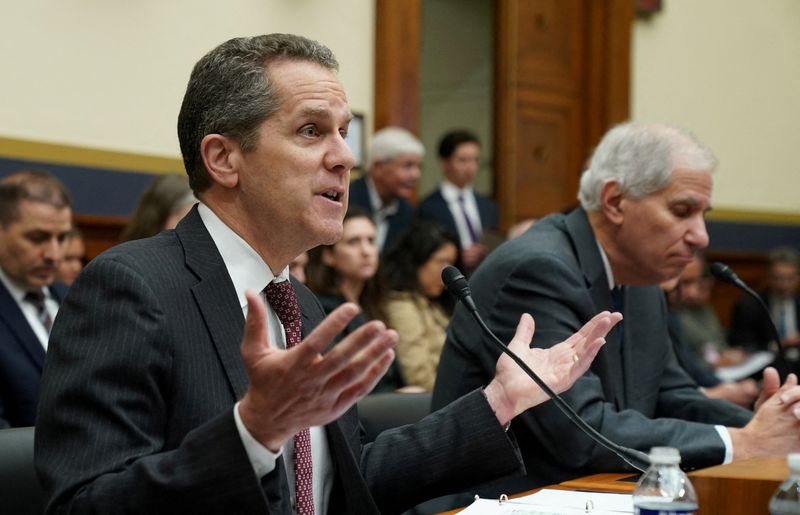By Pete Schroeder
WASHINGTON (Reuters) -Federal Reserve Vice Chair for Supervision Michael Barr has sought legal advice to explore his options against any attempts by President-elect Donald Trump to remove him, sources said, the latest sign that a conflict might be looming between the incoming administration and the central bank.
Barr, who was tapped to serve as the Fed's top regulatory official by President Joe Biden, has in recent weeks sought advice from law firm Arnold & Porter in his personal capacity, two of the sources said.
The sources said he has sought counsel in a personal capacity because typically individual officials, not their agencies, have legal standing to fight in court attempts to remove them.
The Fed declined to comment via a spokesperson. Representatives for Arnold & Porter and the Trump transition did not respond to requests for comment. Barr did not respond to a call or email requesting comment.
Barr, whose term overseeing bank supervision expires in July 2026, has told Congress that he intends to serve it out. Reuters could not learn further details about Barr's discussions with lawyers, including whether he would fight his removal or not.
The sources requested anonymity to speak about Barr's plans.
Barr's move comes after reports in recent months that Trump’s advisers were looking for ways to increase the incoming White House’s sway over the Fed, alarming officials and investors who argue that the central bank's independence is necessary for it to be able to properly set monetary policy.
Fed Chair Jerome Powell -- who was appointed to the role by Trump only to be subsequently criticized for his decisions on interest rates -- was seen as a target of the incoming president. But Powell said after the November presidential election that Trump would not have the authority to remove him. Trump subsequently said he does not intend to remove Powell.
The law establishing the Fed says the president is only allowed to fire Fed governors for cause, but it is silent on whether Trump would have the power to demote Barr from his role as Vice Chair for Supervision. Powell has previously said demoting Fed officials is not permitted under the law.
Barr has earned powerful critics on Wall Street and elsewhere for his tough approach to financial regulation.
Earlier this week, the Wall Street Journal's conservative editorial page argued Trump should fire him for cause, citing the failures by bank supervisors to address problems ahead of Silicon Valley Bank's abrupt failure in March 2023.
Trump's advisers and other Republicans have debated pursuing that approach with Barr, according to two of the sources, who were briefed on the matter.
Barr's decision to explore outside legal counsel underscores how seriously he is taking that threat.
WALL STREET'S IRE
Barr earned the ire of Republicans and the banking industry for his efforts to impose strict new capital rules on the industry via so-called "Basel III Endgame" and other projects.
Barr said the sector needed more guardrails against future turmoil, but those efforts were met with intense pushback from banks, who argued they were unjustified and threatened to sue over what they claimed was improper procedure.
Barr eventually agreed to pare back those efforts, but a rewritten proposal never advanced due to infighting among U.S. bank regulators.
If Barr were to stay, he likely would not be able to advance tough new rules that would require buy-in from other agencies taken over by Trump appointees, but he could stand in the way of regulatory easing sought by big Wall Street banks.
While Trump has said little on bank regulation, his campaign has promised to slash "burdensome" regulations.
Barr also has a separate 14-year term as Fed governor that runs until 2032, but officials frequently step down from that post before serving the full allotment, particularly if they had previously served in a more senior role.

There is no precedent for a president to try to remove a Fed official. But messy succession fights at regulatory agencies are not unfamiliar territory for Trump. In his first term, his administration was challenged in court over his attempts to name new leadership at the Consumer Financial Protection Bureau.
There, the agency's deputy, Leandra English, resisted efforts to install an outside Republican official as leader of the agency, going so far as to challenge the move in court on a personal basis. She eventually dropped that suit and resigned.

